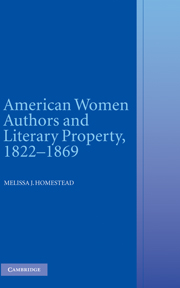Book contents
- Frontmatter
- Contents
- Preface: “Imperfect Title”
- Acknowledgments
- Introduction: “Lady-Writers” and “Copyright, Authors, and Authorship” in Nineteenth-Century America
- 1 Authors, Wives, Slaves: Coverture, Copyright, and Authorial Dispossession, 1831–1869
- 2 “Suited to the Market”: Catharine Sedgwick, Female Authorship, and the Literary Property Debates, 1822–1842
- 3 “When I Can Read My Title Clear”: Harriet Beecher Stowe and the Stowe v. Thomas Copyright Infringement Case (1853)
- 4 “Every body sees the theft”: Fanny Fern and Periodical Reprinting in the 1850s
- 5 A “Rank Rebel” Lady and Her Literary Property: Augusta Jane Evans and Copyright, the Civil War and After, 1861–1868
- Epilogue: Belford v. Scribner (1892) and the Ghost of Mary Virginia Terhune's Phemie's Temptation (1869); or, The Lessons of the “Lady-Writers” of the 1820s through the 1860s for Literary History and Twenty-First-Century Copyright Law
- Index
1 - Authors, Wives, Slaves: Coverture, Copyright, and Authorial Dispossession, 1831–1869
Published online by Cambridge University Press: 24 July 2009
- Frontmatter
- Contents
- Preface: “Imperfect Title”
- Acknowledgments
- Introduction: “Lady-Writers” and “Copyright, Authors, and Authorship” in Nineteenth-Century America
- 1 Authors, Wives, Slaves: Coverture, Copyright, and Authorial Dispossession, 1831–1869
- 2 “Suited to the Market”: Catharine Sedgwick, Female Authorship, and the Literary Property Debates, 1822–1842
- 3 “When I Can Read My Title Clear”: Harriet Beecher Stowe and the Stowe v. Thomas Copyright Infringement Case (1853)
- 4 “Every body sees the theft”: Fanny Fern and Periodical Reprinting in the 1850s
- 5 A “Rank Rebel” Lady and Her Literary Property: Augusta Jane Evans and Copyright, the Civil War and After, 1861–1868
- Epilogue: Belford v. Scribner (1892) and the Ghost of Mary Virginia Terhune's Phemie's Temptation (1869); or, The Lessons of the “Lady-Writers” of the 1820s through the 1860s for Literary History and Twenty-First-Century Copyright Law
- Index
Summary
In Mary Virginia Hawes Terhune's novel Phemie's Temptation (serialized in 1868 in Godey's Lady's Book under the less provocative title of Phemie Rowland, published in book form in 1869, and published in both instances under her long-time pseudonym “Marion Harland”), the intersection of two forms of property law, the law of coverture and the law of copyright, drives the novel's plot. The eponymous heroine's bankrupt husband, James Hart, abandons her, and in order to support herself and her daughter, she resumes the career as an author she had abandoned when she married. As she begins to put a new life together for herself, Phemie faces the intersection between her legal disabilities under the common law doctrine of coverture and her literary proprietorship in an extreme form. Not only is James Hart her husband, he is also her publisher. Early in her marriage, without her husband's prior knowledge or consent, she publishes a novel under the pseudonym “Epsilon,” hoping he will be pleased after the fact. Instead, he is outraged. Her husband's publishing house, through his partner Mallory, published Phemie's book without Mallory knowing the identity of “Epsilon” (although Mallory does find out after Phemie reveals her authorship to her husband). After Hart absconds and Mallory fails to produce the royalties due to Phemie for the considerable sales of the book, Joe Bonny, her sister's husband, suggests that she sue.
- Type
- Chapter
- Information
- American Women Authors and Literary Property, 1822–1869 , pp. 21 - 62Publisher: Cambridge University PressPrint publication year: 2005



